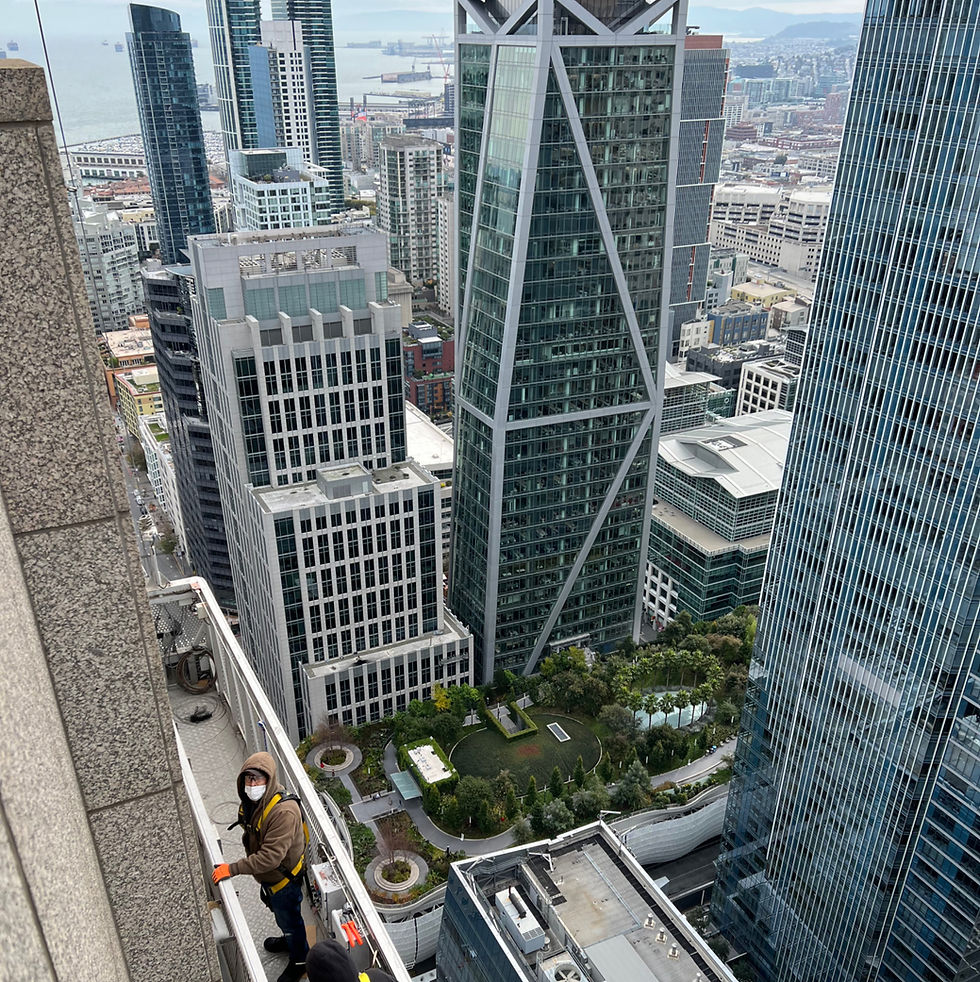5 Signs Your Property Needs Bird Control
- Michael Gelder
- Jul 30, 2025
- 4 min read
Whether you're managing a warehouse, office building, retail center, or industrial facility, knowing these five telltale signs can help you take action before a minor bird presence becomes a full-blown infestation. Let's dive into what you should be watching for.
Sign #1: You're Seeing Droppings Everywhere
This one might seem obvious, but you'd be surprised how many property managers dismiss a few bird droppings as "no big deal." Here's the reality: bird droppings are like the canary in the coal mine (pun intended); they're your first and clearest warning sign.
Fresh droppings on walkways, loading docks, outdoor seating areas, or building ledges indicate active bird activity. But here's what makes this particularly concerning: bird droppings aren't just unsightly – they're acidic and can permanently damage building materials, paint, and metal surfaces.
Cost Reality Check: Cleaning and repairing damage from bird droppings can cost $1,000-$5,000 per incident, depending on the affected area and materials involved.
What to look for: Concentrated droppings in specific areas (indicating roosting spots), droppings on or near building entrances, and any accumulation on equipment or vehicles.
Sign #2: Nesting Materials Are Appearing
Found twigs, grass, or debris in unusual places around your property? Birds are probably setting up shop. Nesting materials in gutters, HVAC units, signage, or building crevices are a dead giveaway that birds have decided your property is prime real estate.
The tricky part about nesting is that once birds establish a nesting site, they tend to return year after year. It becomes their permanent address, and evicting them gets increasingly difficult (and expensive) over time.
Pro Tip: Check areas that are sheltered from weather and predators – these are bird favorites. Think loading dock overhangs, architectural features, and equipment housings.
Nesting materials can also clog drainage systems, create fire hazards near electrical equipment, and provide breeding grounds for insects and parasites.
Sign #3: Increased Bird Noise and Activity
Are you hearing more chirping, squawking, or general bird chatter around your property? Increased vocal activity usually means one of two things: either you have a growing bird population, or it's breeding season and they're getting territorial.
Pay attention to patterns. If the noise is consistent throughout the day and concentrated in specific areas, you likely have established roosting sites. If it's more intense during dawn and dusk, birds are probably using your property as a gathering point before moving to feeding or roosting areas.
This might seem like a minor annoyance, but consider the impact on your tenants, customers, or employees. Excessive bird noise can:
Disrupt business operations
Create complaints from tenants or visitors
Indicate a growing population that will become harder to manage
Signal that birds are becoming comfortable and established
Sign #4: Equipment Damage or Interference
This is where bird problems go from annoying to expensive. Birds love to perch on equipment, and their presence can cause serious operational issues:
HVAC systems: Nesting materials can block vents and damage equipment
Electrical equipment: Birds can cause power outages and equipment failures
Solar panels: Droppings reduce efficiency, nesting can cause damage
Signage and lighting: Droppings and nesting materials affect visibility and function
Real Cost Example: A single bird-related power outage can cost a commercial facility $10,000-$50,000 in lost productivity, not including repair costs.
If you're noticing equipment malfunctions, unexplained outages, or maintenance issues in areas where birds are present, it's time to take action. The longer you wait, the more expensive the fixes become.
Sign #5: Complaints from Tenants, Customers, or Employees
Sometimes the clearest sign that you need bird control comes directly from the people using your property. When tenants start complaining about bird droppings on their cars, customers avoid certain entrances, or employees mention bird-related issues, you're past the "early warning" stage.
These complaints often indicate that the bird problem has reached a level where it's affecting people's daily experience with your property. Common complaints include:
Droppings on vehicles in parking areas
Birds dive-bombing or acting aggressively (especially during nesting season)
Unsanitary conditions around building entrances
Noise disrupting work or business activities
Concerns about health and safety
Remember, by the time people are complaining, the problem has likely been building for weeks or months. Quick action at this stage can prevent the situation from escalating further.
Early Action Saves Money
Here's the thing about bird control – it's always cheaper to address the problem early than to wait until you have a full-scale infestation. A proactive approach can cost a few hundred to a few thousand dollars, while dealing with an established bird population can run into tens of thousands when you factor in cleanup, repairs, and ongoing management.
Quick Action Checklist:
Document the signs you're seeing (photos help)
Note the specific locations and times of day when bird activity is highest
Assess any current damage to property or equipment
Consider the impact on your tenants, customers, or operations
Get a professional assessment before the problem grows
The key is recognizing these signs early and taking action before birds become entrenched. Once they've established your property as their territory, removal becomes significantly more complex, time-consuming, and expensive.
What's Next?
If you're seeing one or more of these signs, don't wait. Bird problems have a way of escalating quickly, especially during breeding seasons. A professional bird control assessment can help you understand the scope of the issue and develop a targeted solution that fits your property and budget.
Remember, effective bird control isn't just about getting rid of the birds you can see – it's about creating conditions that prevent them from returning. The right approach combines immediate solutions with long-term prevention strategies. Contact one of our bird control experts today to determine a solution to prevent your minor bird problem from becoming a costly catastrophe.



Comments